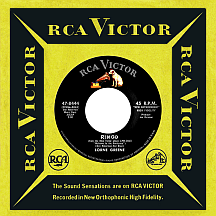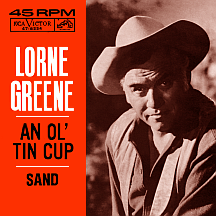LORNE GREENE
Ringo
By the time he'd reached his forties, Lyon Himan Green was familiar to nearly everyone in the United States and many countries worldwide. Not by his given name, mind you, but no less than two others: professional name Lorne Greene (spelled with an extra "e") and that of his character, Ben Cartwright, on the classic Bonanza TV series that aired for 14 seasons on NBC, followed by near-daily reruns ever since. Though career-defining, his fame was not limited to just this one show, as his talent and personality extended to radio, theater, film and even the music business. At the same time Bonanza was sitting at the top of the weekly ratings, he enjoyed a surprise number one hit with a spoken tale about a notorious gunslinger known thoughout the wild west as "Ringo."
Lorne was born in the Canadian capital of Ottawa, Ontario and initially planned to pursue a career in acting, but an opportunity in radio arose and by his mid-twenties he was a top announcer for the Canadian Broadcasting Corporation. His daily newscasts covering World War II resulted in the media nicknaming him "The Voice of Doom." After the war ended in 1945, he built an impressive resumé as an actor in theater productions. A trip to New York City in the early 1950s opened the door to a TV career, leading to roles in literally dozens of anthology-type shows (including Studio One, Philip Morris Playhouse, You Are There and Alfred Hitchcock Presents) over the next few years.
In 1955, Greene starred in his first weekly television series, Sailor of Fortune, a high seas adventure drama produced in England and later seen in U.S. syndication. More work on American shows followed (Kraft Theater, Playhouse 90), along with supporting roles in feature films (Peyton Place, The Gift of Love and westerns like The Hard Man and The Last of the Fast Guns). An appearance in a 1959 episode of NBC's high-rated Wagon Train directly preceded the role that made him a major star; as Ben of NBC's Bonanza, the first weekly dramatic series broadcast in color, he became the small screen's quintessential period-piece father figure (honorable mention: Chuck Connors of The Rifleman, which had begun on ABC a year earlier). Bonanza was a boon to Greene's career, as it was to his costars, fictional sons (each with a different mother!) Adam (Pernell Roberts), Hoss (Dan Blocker) and Little Joe (former "Teenage Werewolf" Michael Landon).
Viewing increased with each passing year (in part because sales of color sets were on the rise) and in 1962 the cast recorded an original cast album for RCA Victor (subtitled Ponderosa Party Time!) that kicks off with a 39-second version of the show's theme and follows with 13 down-home, fiddlin' and banjo-playing songs ("Skip to My Lou," anyone?) with vocals by all four of the series' stars; it spent several weeks on the album charts late in the year. "My Sons, My Sons," a sentimental Jay Livingston-Ray Evans number spoken and sung by Greene, was released as a single and led to a solo contract for the Cartwright patriarch. His first album, Young at Heart, was primarily a singing effort, but it soon became clear his rich speaking voice might be the better way to go.
A follow-up LP with the Bonanza cast, Christmas at the Ponderosa, contains the usual seasonal song list. In 1964 Greene recorded a classical album with British conductor Malcolm Sargent and the London Symphony Orchestra, Peter and the Wolf, narrating Sergei Prokofiev's symphony that had been marketed to children for decades in dozens of celebrity versions. Around this time, Bonanza hit its peak of popularity, becoming TV's number one show (it held this enviable position in its sixth, seventh and eighth seasons, 1964 through 1967). Then Greene had his greatest success as a recording artist, when good timing collided with a certain "buzz word" on the lips of most teenagers.
Welcome to the Ponderosa, his third album made without the help of Adam, Hoss and Little Joe, included "Ringo," a dramatic spoken sagebrush saga penned by Don Robertson and Hal Blair. Inspired by real-life wild west bad guy Johnny Ringo, the fictional narrative focused on what happens after one man helps an injured desperado back to health: 'One day we rode the mountain crest, and I went east and he went west...I took to law and wore a star, while he spread terror near and far,' a story as exciting as any B western matinee, ending with Greene's character gunning down his outlaw friend...or does he? The single debuted on the national charts in October 1964 and rode right over that crest, hitting number one the first week in December. It was straightforward six-gun storytelling, but don't let anyone tell you The Beatles, who'd spearheaded the year's hot British Invasion, didn't factor into the record's success...especially considering its climactic ending: '...they can't explain the tarnished Starr above the name...of Ringo...' RCA's top dogs knew what they were doing and besides, it's hard not to picture Ringo Starr in a cowboy costume every time you hear the song, brandishing a revolver in place of his drumsticks!
Greene suddenly had carte blanche to make as many albums as he liked...four more for RCA, as it turned out, over the next two years. Three additional singles hit various national charts during this time: "The Man," an inspirational piece written by Merle Kilgore, "Five Card Stud," a Wally Gold-David Hill tune (with an arrangement similar to Jimmy Dean's 1962 hit "The Cajun Queen") about a friendly poker game in a saloon, and Hal Blair and Jimmie Haskell's theme for "Waco," the 1966 film starring Howard Keel and Jane Russell. After leaving RCA Victor (while Bonanza continued to attract tens of millions of viewers each week), he made one-off records for Columbia and GRT along with a spoken children's album, The Robin Hood of Eldorado, recorded in 1971 with Randy Sparks, the founder of folk group The New Christy Minstrels.
Bonanza ended its long run in 1973. Greene narrated the short-lived CBS documentary series Appointment With Destiny, then made his return to feature films with, of all things, Nippon Chinbotsu, a Japanese disaster movie released in North America as Tidal Wave, with added scenes featuring Greene (much as had been done more famously and much more successfully two decades earlier with Raymond Burr's addition to Godzilla). That fall, Lorne starred as a detective in ABC's Griff, but it lasted only a few months. He was one of the all-star cast of Earthquake, a 1974 box office blockbuster and Special Effects Oscar winner. He slipped in another single release, the spoken "Spirit of America" in the bicentennial year, and was part of the large cast of Roots, one of the highest-rated television events of all time, in January '77. His starring role in the ABC sci-fi series Battlestar Galactica and its near-immediate sequel, Galactica 1980, guaranteed him a rabid fan base far beyond the sprawling borders of the Ponderosa Ranch. He even starred in another ABC show, the fire department drama Code Red in 1981 and '82. And let's not forget his long-running series of Alpo dog food commercials! Lorne Greene did it all!



